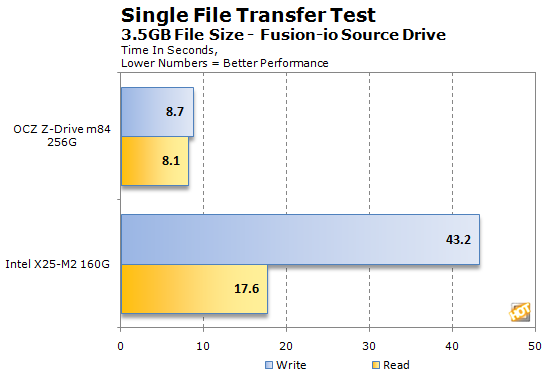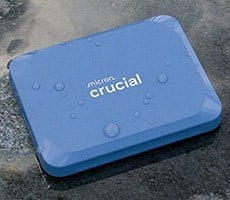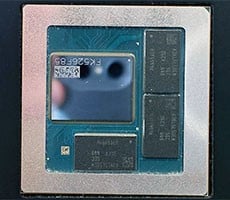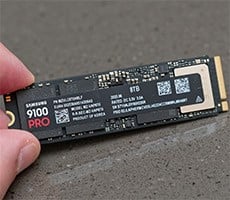
Our final series of tests are what you might call more "crude measurements" in that we simply fired up our trusty stop-watch and measured the time it took to complete a copy and paste command of a single large file or a bunch of large files from one storage volume in our test system to another.
** Please note that we utilized a Fusion-io PCI Express SSD card as our source drive in some of the following tests, to read files from or copy files to, for our read and write measurements of both the OCZ Z-Drive and Intel SSD. This affords us the luxury of much higher available bandwidth from the source or target drive (depending on whether we were reading from or writing to it), such that it would not be the limiting factor in a given test condition. Remember the 160GB Fusion-io drive we're using here retails for ~ $7,000, so it's in a class by itself and performs as such. It does make for an excellent test vehicle, though we've also included some measurements with a standard WD Raptor 150GB hard drive as our source or target drive, to offer a more practical usage model and benchmark measurement.
 |
| Bulk File Transfer Tests - Read/Write Performance |
| Custom File Transfers Measured | |


In our single, large file transfer test, we're moving a 3.5GB zip file comprised of several HD video clips, across from a source drive to either the Z-Drive or Intel SSD as our targets for the write test. For the read test, we're moving that file from the Z-Drive or Intel SSD to another target drive in the system. As you can see, we're also showing the Fusion-io drive as a source/target drive, as well as the standard WD Raptor hard drive in this role. Obviously, under the virtually limitless bandwidth setup with the Fusion-io drive as a companion target or source, the OCZ Z-Drive m84 proves itself to be 2 - 5 times faster than a single Intel X25-M gen 2 SSD with this very large file transfer workload. Under the limitation of the WD Raptor drive, we only see a 10 - 25% edge for the Z-Drive but regardless, the potential available bandwidth is there.

Our multi-file transfer test, which is comprised of a dozen or so large 100 - 300MB+ sized files shows more of the same advantage for the OCZ Z-Drive, again when working with a source or target that has large amounts of available throughput itself.










